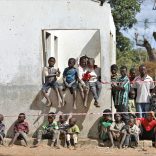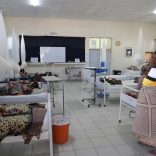Mozambique Insurgency grows at 'sensitive' time for TotalEnergies' return - AFP
WFP transitioning to recovery activity in Northern Mozambique

Photo: in file CoM
The United Nations’ World Food Programme (WFP) on Thursday announced that it has started to gradually transition from life-saving food assistance to recovery and resilience activities in northern Mozambique.
In its latest country brief, WFP laments that nationally high malnutrition affects almost half of children under 5 years of age and that over 2.9 million people face severe acute food insecurity. It notes the negative economic effect of the Covid-19 pandemic and that nearly half of the population remain below the poverty line.
WFP adds that “Mozambique remains one of the most disaster-prone countries in the world, with drought and pests affecting staple crops in much of the country while the central part has been affected by cyclones every year leading to agricultural losses, destruction of infrastructure, assets and livelihoods as well as internal displacement. Thus, significant challenges remain to achieve food and nutrition security. Mozambicans still cannot afford the cost of a nutritious diet”.
The situation is particularly dire in the northern province of Cabo Delgado, which has seen islamist terrorism wreak murderous havoc with people in many areas forced to flee from their homes and livelihoods. WFP notes that “after two decades of peace and stability, the intensification of violence in Cabo Delgado Province threatens socio-economic progress”.
Despite significant progress by the Mozambican defence and security forces, along with their allies from the Southern Africa Development Community Mission in Mozambique (SAMIM) and Rwanda, in dislodging the terrorists and returning security to the affected areas, it will take many months before everyone returns to their homes and restart their lives.
During November, WFP provided life-saving food assistance to 800,000 people in northern Mozambique. However, it points out that it was only able to provide half rations, equivalent to 39 per cent of daily calories, due to a lack of funds, although full rations will be resumed in January during the peak lean season.
The country brief adds that WFP is conducting a vulnerability-based targeting exercise covering the displaced and their host communities to ensure that it is reaching the most vulnerable people.
In a significant move, WFP states “acknowledging that development projects are fundamental for the long-term stability and peace in northern Mozambique, WFP has started to gradually transition from life-saving food assistance to recovery and resilience activities”.
To begin with, five livelihoods projects are being implemented in six districts of Cabo Delgado that will benefit 45,000 people, of whom 80 per cent are internally displaced persons with the remaining coming from host communities. In addition, it is distributing agricultural inputs for the main agricultural campaign.
WFP warns that it needs 89.9 million US dollars to sustain its work in northern Mozambique until June 2022 and that if it does not receive sufficient funds in a timely manner a pipeline break is expected in April. Nationally, it needs 157.8 million US dollars to continue its work until May 2022.
WFP has been present in Mozambique since 1977, working with the government to provide food, nutrition, and livelihood assistance to the most vulnerable communities.












Leave a Reply
Be the First to Comment!
You must be logged in to post a comment.
You must be logged in to post a comment.